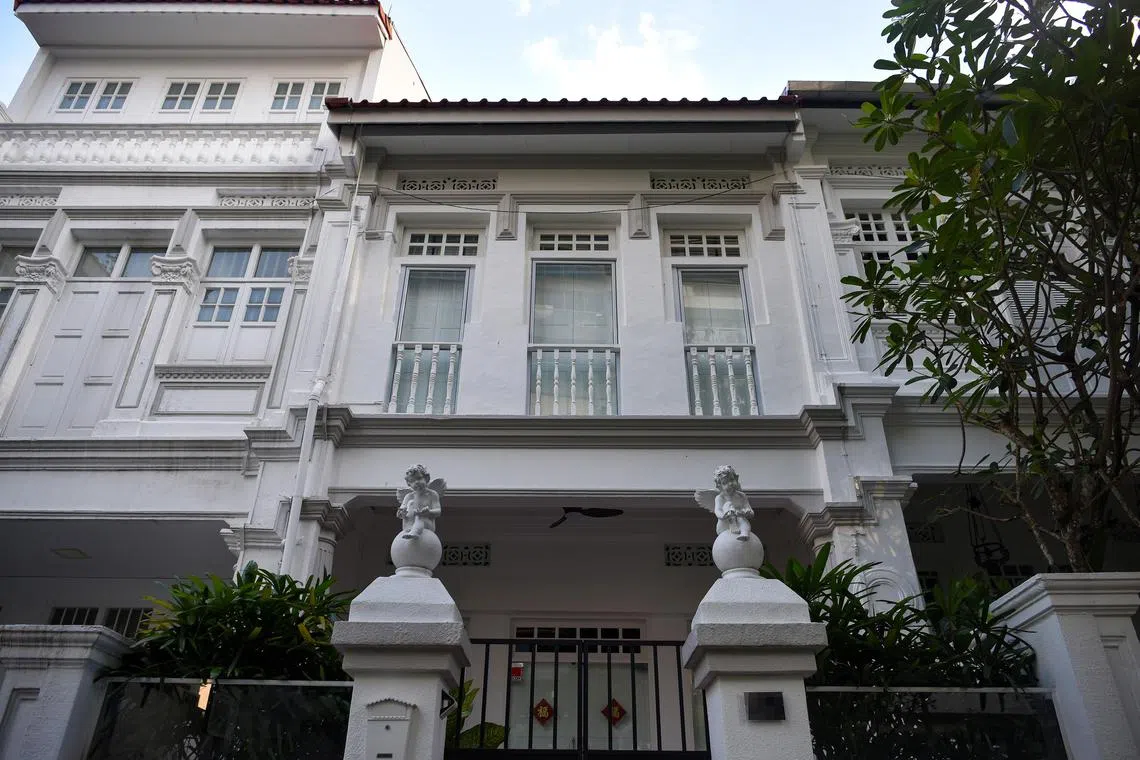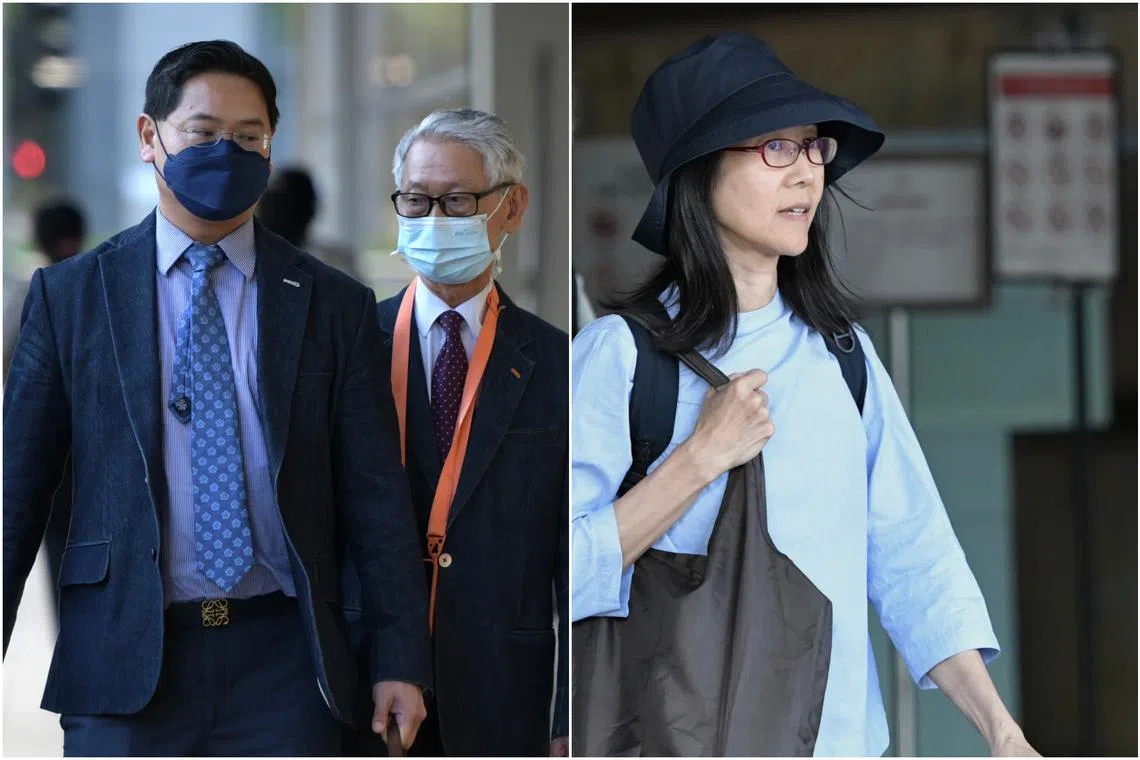Judge rules former MP sued by son’s ex-wife is not sole owner of shophouse
Sign up now: Get ST's newsletters delivered to your inbox

The conservation shophouse in Martaban Road was bought in December 2009 for $2.1 million and registered in Dr Chiang Hai Ding's name.
ST PHOTO: EUGENE TAN
Follow topic:
SINGAPORE – A High Court judge rejected the contention of former MP and retired ambassador Chiang Hai Ding that he was the sole owner of a Balestier shophouse that his son’s former wife has claimed is a matrimonial asset.
The conservation shophouse in Martaban Road was bought in December 2009 for $2.1 million and registered in Dr Chiang’s name.
He put down $300,000 towards the down payment, while his son Joon Arn paid $520,000 and took out a $1.28 million mortgage.
At the time, rules stipulating that the borrower must also be the mortgagor had not yet come about.
Ms Sabrina Tan, who married Mr Chiang Joon Arn in December 2011 and filed for divorce in October 2020, had sued father and son in the High Court over the ownership of the shophouse.
The suit arose out of disagreement in ongoing divorce proceedings over whether the shophouse – now estimated to be worth between $3 million and $4 million – falls within the pool of matrimonial assets to be divided.
In a written judgment on Thursday, Justice Hoo Sheau Peng said she had no hesitation in dismissing the Chiangs’ narrative that Joon Arn had bought the property as a gift to his father because he wanted to help the older man realise his dream of living in a shophouse.
However, the judge also found insufficient evidence to support Ms Tan’s main contention that Dr Chiang was holding the property on trust for the couple.
Ms Tan, who was represented by Ms Melanie Ho, Mr Gavin Neo and Ms Jolyn Khoo, said the property was bought in Dr Chiang’s name because the couple could not buy private property in their own names.
This was due to the five-year minimum occupation period (MOP) after their purchase of a Housing Board flat at Pinnacle@Duxton.
Justice Hoo ruled that, given the financial contributions towards the purchase price, Dr Chiang was the beneficial owner of 14.29 per cent of the shophouse and was holding the other 85.71 per cent on trust for his son.
Whether Mr Chiang’s 85.71 per cent stake in the shophouse forms part of the pool of matrimonial assets to be divided will be separately determined in the divorce proceedings.
Justice Hoo concluded from the evidence that, in happier times, the couple desired to own a shophouse and Dr Chiang helped by allowing the property to be registered in his name.

Former MP and retired ambassador Chiang Hai Ding and his son Joon Arn (both left) are being sued by his son's former wife Sabrina Tan (right).
ST PHOTOS: SHINTARO TAY
Given that she was about to marry Mr Chiang, Ms Tan did not object to the arrangement, the judge surmised. In fact, Ms Tan was involved in the acquisition of the property and in taking care of the property after its purchase.
As it transpired, Mr Chiang was short of funds, and Dr Chiang contributed towards the down payment.
“While this gained Dr Chiang a small beneficial interest in the property, it was not meant to be an outright gift to him,” said the judge.
Dr Chiang was the People’s Action Party MP for Ulu Pandan from 1970 to 1984; he also served as Singapore’s ambassador to more than 10 countries, including the former Soviet Union.
Ms Tan worked as a chartered accountant. In 2002, she gave up her career and moved to the United States to live with Mr Chiang, also a chartered accountant, who was posted there for work.
The couple successfully balloted for the Pinnacle flat in 2004 or 2005 as their matrimonial home.
In 2009, Ms Tan identified the shophouse as a suitable property to buy. The shophouse was rented out and the rental income used to repay the mortgage. At times when the property was not rented out, Mr Chiang would service the mortgage.
He paid the property tax for at least the past six years, and reimbursed his father for income tax payments arising from the property’s rental income.
In her judgment, Justice Hoo said the assertion that Dr Chiang dreamed of living in a shophouse was not supported by any evidence. Instead, he testified that he had never stayed there and had no intention of doing so.
The judge said it was very unlikely that Mr Chiang, who was just starting out in his career and preparing to settle down with Ms Tan in 2009, would make such a substantial gift to his wealthy father.
She said Dr Chiang’s explanation that he had to contribute to the cost of his own gift because his son had underestimated the down payment required, was “unconvincing”.
Although she rejected the gift narrative, the judge said the deficiencies in the defendants’ case could not be used to fill up gaps in Ms Tan’s case that the parties had intended for Dr Chiang to hold the shophouse on the couple’s behalf.
The judge noted that in 2014, before the couple’s relationship soured, Dr Chiang willed the shophouse only to Mr Chiang.
She found that Mr Chiang’s financial contributions towards the property were his own, and not made on the couple’s behalf. She noted that for the Pinnacle flat, which was their matrimonial home, Ms Tan had made direct financial contributions of her own.


